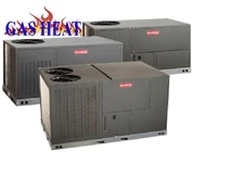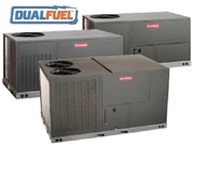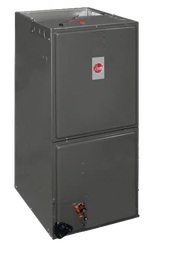A Package AC Unit: Types, Features, Strengths and Weaknesses

No one wants to feel like they’ve been cut loose in a maze when they’re looking for solutions for heating and cooling for their home or business. With so many different options and naming conventions (for what appear to be similar equipment) the path gets more tortuous the deeper you dive into it.
That’s why so many homeowners and business operators rely so heavily on the input of their HVAC specialists. With so much information to dissect, we all need morsels that are a little bit more digestible and easier to understand.
So when you come across a term like “package AC unit” and only then find out that it isn’t even one thing but that there are many different types, it might be time to call in the help of the professionals.
Generally speaking, an AC package unit is a package that contains a cooling system, but usually they also have some form of heating, like an electric heat strip, built into the package. That makes them suitable for heating and cooling in some climates without the need for additional HVAC infrastructure.
Here’s our condensed view of what types of package AC units there are in the HVAC industry, as well as some benefits and potential drawbacks of each. Take in some information here, and if you still have questions at the end of it, by all means, call us!
1.Electric Heat and Air Conditioner Package Units
First up we have electric heat and air conditioning package units, which typically consist of one large unit that includes a condenser. These systems are robust solutions for cooling, and ideal for hotter climates such as in the south. As far as heating, they can typically be paired with electric heat strips. While you can vary the size and capability of the heat strips with which they are paired, even the most powerful electric heat strips are not the best options for colder climates, which generally restricts the practicality of these types of package units.
-Benefits
Electric heat and air conditioner package units can be highly practical for climates that have very hot summers and rarely experience cold winters. Oftentimes, these types of scenarios will never need more than the electric heat strip to keep the home warm.
They are very robust cooling solutions, so if the weather is regularly hot during the summer, this might be the way to go. They’re also better at cooling than heat pumps (although not typically as efficient) which makes them preferable in this scenario.
As the package unit is all-in-one, accessing and maintaining it will be easier. Additionally, a system like this will be suitable for living situations in which you don’t have a lot of space inside your home for HVAC equipment.
An added benefit of this type of unit is that it might be able to save you money over traditional split systems as you’ll pay less for the infrastructure and maintenance and may even pay less for the fuel.
-Drawbacks
With those benefits in mind, an electric heat and air conditioning system lacks the power of traditional systems with a gas furnace. They’re not ideal for areas that experience very cold winters.
Outside of the fact that they lack the same heating power as other alternatives, gas electric systems don’t have too many disadvantages, but that is a big one to consider.
2.Heat Pump - AC Package Units
Heat Pump and AC package units, also known simply as heat pump package units, have gained a lot of notoriety over the years because they are highly efficient and said to have the potential to save a lot of money.
Unlike some other forms of heating and cooling, heat pumps do not actually produce heat. What they do is move heat around. When it is hot outside, (and consequently hot inside) what the heat pump does is gather the air inside your home, remove the heat from it, and then vent it to the outside. Conversely, in the winter, heat pumps gather heat from the cold air outside (there is still heat in it!) consolidate it, and use it to heat your home.
The manner in which heat pumps work is very efficient, so you may be able to realize some financial savings from the implementation of a heat pump. Just make sure you heed the following considerations.
-Benefits
Heat pumps are very energy efficient, so it has often been claimed that homes that implement them can save money on heating and cooling. However, to be sure of what you can project, you’ll want to work closely with an HVAC specialist to make sure of this before making any changes. You might also want to have some sort of audit performed on your home.
Generally speaking, heat pump systems also require less maintenance than other systems. In addition to this, they have very long lifespans, so you might be able to save money on a few different fronts. Also, since they use less energy, some consider them a “greener” alternative to some other forms of heating and cooling.
Also, since these are package units we’re talking about, it’s important to remember that a heat pump can provide both heating and cooling. Some of our package units also come with an electric condenser to provide additional cooling power, however.
-Drawbacks
On the flipside, just like electric heat strips and air conditioner package units, heat pumps lack the raw power of other systems. The difference here is that heat pumps, despite their efficiency, lack the power of both gas furnaces and electric air conditioning systems. For this reason, they are not usually suitable for climates that get either too hot or too cold.
Also, the upfront cost of heat pump package units is typically higher than other alternatives, which makes it somewhat less appealing to some buyers. Just keep in mind that there is potential to recover those costs with the energy savings.
One more thing to note is that the installation process with a heat pump can be very involved and potentially invasive. Naturally, consult with a specialist or call us and we’ll let you know more about what’s involved with any given installation.
3.Gaspacks: Gas Heat AC Package Units

Next we have gas heat and AC packages units, which are also known as gaspacks. These types of package AC units generally include an electric air conditioning unit with a condenser as well as a gas powered furnace. In this respect, they somewhat resemble some traditional split systems with multiple components, but are more compact and cost-effective due to the fact that they are bundled.
-Benefits
As with other package units, gaspacks are compact and better for living situations where there is limited space. Additionally, as they are bundled maintenance can be more effective and streamlined. Along the same lines, they may also be more affordable than traditional split systems.
Where the true value of most gas heat and electric systems comes into focus is in the fact that you have all of the benefits of gas powered heat and electric cooling. Gas packs are much more efficient at heating homes than heat pumps and heat strips, which makes them suitable for colder climates.
Along the same lines, the electric air conditioners that are usually paired with gaspacks are more effective at cooling and much more powerful than heat pumps. Though they lack the objective energy efficiency of heat pumps, they are still relatively energy efficient and while remaining much more powerful.
-Drawbacks
While not necessarily a true disadvantage, gaspacks have heating power and cooling power that may not be necessary in some climates. For example, in some areas in the south with mild winters, the extra power of gas heat may simply not be necessary. It’s really just a matter of understanding your environment and making decisions from there.
One other thing to keep in mind is that although electric heating is not particularly efficient, electric heating options (like heat strips and heat pumps) will last a very long time, for outpacing the projected lifespans of most gas-powered models.
4.Dual Fuel Hybrid Units
Dual-fuel systems are very unique in that they combine some of the efficiency of a heat pump with the power of a gas furnace, and then bundle it into one package. In fact, that is exactly what most dual fuel systems are - an electric heat pump and a gas furnace.
These systems work like this: most of the time, your heating and cooling are provided by the heat pump that is a part of it. The gas fired portion of the system doesn’t get activated until it gets below a certain temperature. Because of that feature, this type of packaged system comes with some of the following benefits.
-Benefits

As you might have guessed, because dual fuel systems contain a gas fired packaged heating element, they are highly suitable for colder climates. The main advantage of a gas furnace is the fact that it is cost-effective at providing a lot of heating power. However, since it only works occasionally, you can get a lot more mileage out of it since it won’t be running as frequently.
The other thing that’s great about dual fuel systems is that they pair all of the benefits of a heat pump. There could theoretically be years where you don’t even need to use your furnace and your heat pump will provide all the heating you need. They’re efficient, long lasting, and green, as stated above.
-Drawbacks
One of the drawbacks of dual fuel systems with heat pumps is that, since heat pumps are not particularly powerful with cooling a home, they’re not really as suitable for hotter climates as some of the other options here. Actually, all things considered, they might be the best option for cold climates because they’re geared towards providing heat.
However, since the relative benefits and drawbacks of gas furnaces and heat pumps are somewhat at odds with each other, having this type of system cancels most of them out.
Other Heating and Cooling Solutions
Those are four of the types of package AC units that we sell here at Budget Air Supply, but in case you were wondering, here are some other options for heating and cooling your home that you may want to investigate while you’re here.
-Split Systems
Split systems are systems for heating and cooling that are better for homes that have more indoor space. Typically, split systems have a condenser located outside, with an air handler and potentially a furnace inside. These are sometimes more powerful than package units, but they also take up more room, are louder, and require more maintenance. For more information, contact us and we’ll fill you in.
-Mini Splits

Like split systems, mini split systems are also split into two sections, one contained outside and the other housed indoors. However, they take up less room than traditional splits, since they are smaller, and the nature of their construction eliminates the need for ductwork.
A Note on Air Handlers
One more quick note is on the function of air handlers, which are often included as a component of a split system. The air handler, which sits inside the home, helps to circulate air around the home. This enables the cool air from the condenser or the warm air from the condenser to reach other areas of the home - although some air handlers actually have the ability to cool air as well.
Call Us!
Still have questions about what split system or package AC unit is right for your home? Don’t be a stranger, you can reach out to us anytime and we’d be happy to shed some light on a subject that can be confusing to first-timers.
We’ll even help you pick out what’s right for your home, and when you shop with us here at Budget Air Supply, you’ll even get a good deal on the purchase. We have low prices across the board, a low-price guarantee, and we even offer free shipping! Call us today at 855-473-6484 to learn more!
Recent Posts
-
Weighing the Pros and Cons of Scratch and Dent HVAC Units
Weighing the Pros and Cons of Scratch and Dent HVAC Units Replacing an HVAC system is a significant …20th Apr 2025 -
Goodman 3.5 Ton Condenser — 15.2 SEER2 Straight Cool A/C
The Goodman GSXH504210 3.5 Ton 15.2 SEER2 Straight Cool A/C Condenser delivers powerful, energy …13th Apr 2025 -
Goodman R-32 3.0 Ton 15.2 SEER2 Straight Cool-A/C Split System with Front Return Air Handler
The Goodman R-32 3.0 Ton 15.2 SEER2 Straight Cool-A/C Split System (GLXS4BA3610 + AWST36LU13) d …6th Apr 2025



